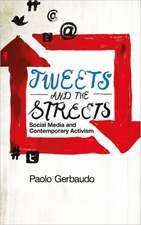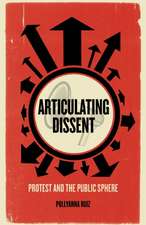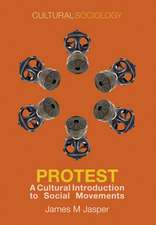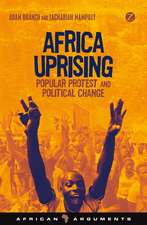Cosmopolitanism and the Legacies of Dissent: Routledge Studies in Social and Political Thought
Editat de Tamara Caraus, Camil Alexandru Parvuen Limba Engleză Paperback – 14 oct 2024
This book is a comparative, historical analysis of dissident thought and practice for contemporary debates on cosmopolitanism. Divided into two parts, the editors and contributors explore the contribution of ‘paradigmatic’ dissidents like Gandhi, Martin Luther King, Havel, Sakharov, Mandela, Liu Xiaobo, Aung San Suu Kyi towards a post-universalist cosmopolitan theory. Part Two examines the inherent cosmopolitanism of the seemingly ‘peripheral’ dissent of contemporary forms of protests, resistance, direct action like NO TAV movement and Occupy Wall Street.
A timely book which allows for a much needed new engagement in contemporary debates of cosmopolitanism, we learn how practical resistance to totalizing/hegemonic claims is generated, and how dissident thinking might contribute to new, enriched ways of conceiving the non-totalizing foundations of cosmopolitanism. An innovative look at what lessons can scholars of cosmopolitanism learn from dissent/dissident movements, and what the role of dissent in cosmopolitan democracy could be.
| Toate formatele și edițiile | Preț | Express |
|---|---|---|
| Paperback (1) | 262.14 lei 6-8 săpt. | |
| Taylor & Francis – 14 oct 2024 | 262.14 lei 6-8 săpt. | |
| Hardback (1) | 526.41 lei 6-8 săpt. | |
| Taylor & Francis – aug 2014 | 526.41 lei 6-8 săpt. |
Din seria Routledge Studies in Social and Political Thought
-
 Preț: 152.42 lei
Preț: 152.42 lei -
 Preț: 296.64 lei
Preț: 296.64 lei -
 Preț: 311.70 lei
Preț: 311.70 lei -
 Preț: 310.96 lei
Preț: 310.96 lei -
 Preț: 340.32 lei
Preț: 340.32 lei -
 Preț: 310.41 lei
Preț: 310.41 lei -
 Preț: 303.87 lei
Preț: 303.87 lei -
 Preț: 319.08 lei
Preț: 319.08 lei -
 Preț: 333.32 lei
Preț: 333.32 lei -
 Preț: 309.82 lei
Preț: 309.82 lei -
 Preț: 287.67 lei
Preț: 287.67 lei -
 Preț: 324.20 lei
Preț: 324.20 lei -
 Preț: 380.89 lei
Preț: 380.89 lei -
 Preț: 221.84 lei
Preț: 221.84 lei - 8%
 Preț: 374.75 lei
Preț: 374.75 lei -
 Preț: 311.41 lei
Preț: 311.41 lei -
 Preț: 319.01 lei
Preț: 319.01 lei -
 Preț: 216.44 lei
Preț: 216.44 lei -
 Preț: 340.26 lei
Preț: 340.26 lei -
 Preț: 279.47 lei
Preț: 279.47 lei -
 Preț: 347.24 lei
Preț: 347.24 lei -
 Preț: 387.02 lei
Preț: 387.02 lei - 18%
 Preț: 1110.47 lei
Preț: 1110.47 lei - 18%
 Preț: 1055.51 lei
Preț: 1055.51 lei - 18%
 Preț: 1058.43 lei
Preț: 1058.43 lei - 18%
 Preț: 1005.73 lei
Preț: 1005.73 lei -
 Preț: 409.73 lei
Preț: 409.73 lei - 18%
 Preț: 1061.81 lei
Preț: 1061.81 lei - 18%
 Preț: 1061.22 lei
Preț: 1061.22 lei - 25%
 Preț: 544.67 lei
Preț: 544.67 lei - 18%
 Preț: 1215.71 lei
Preț: 1215.71 lei - 18%
 Preț: 998.71 lei
Preț: 998.71 lei - 18%
 Preț: 1109.99 lei
Preț: 1109.99 lei -
 Preț: 488.71 lei
Preț: 488.71 lei - 30%
 Preț: 847.73 lei
Preț: 847.73 lei -
 Preț: 416.12 lei
Preț: 416.12 lei - 18%
 Preț: 1054.75 lei
Preț: 1054.75 lei - 28%
 Preț: 769.72 lei
Preț: 769.72 lei - 18%
 Preț: 1059.84 lei
Preț: 1059.84 lei -
 Preț: 489.99 lei
Preț: 489.99 lei - 18%
 Preț: 1062.31 lei
Preț: 1062.31 lei - 18%
 Preț: 1108.42 lei
Preț: 1108.42 lei -
 Preț: 382.65 lei
Preț: 382.65 lei - 42%
 Preț: 181.06 lei
Preț: 181.06 lei - 26%
 Preț: 822.36 lei
Preț: 822.36 lei
Preț: 262.14 lei
Preț vechi: 312.54 lei
-16% Nou
Puncte Express: 393
Preț estimativ în valută:
50.16€ • 52.61$ • 41.76£
50.16€ • 52.61$ • 41.76£
Carte tipărită la comandă
Livrare economică 01-15 aprilie
Preluare comenzi: 021 569.72.76
Specificații
ISBN-13: 9781032922843
ISBN-10: 1032922842
Pagini: 304
Dimensiuni: 152 x 229 mm
Greutate: 0.56 kg
Ediția:1
Editura: Taylor & Francis
Colecția Routledge
Seria Routledge Studies in Social and Political Thought
Locul publicării:Oxford, United Kingdom
ISBN-10: 1032922842
Pagini: 304
Dimensiuni: 152 x 229 mm
Greutate: 0.56 kg
Ediția:1
Editura: Taylor & Francis
Colecția Routledge
Seria Routledge Studies in Social and Political Thought
Locul publicării:Oxford, United Kingdom
Public țintă
Academic and PostgraduateCuprins
Introduction: Cosmopolitanism of Dissent Tamara Caraus Part 1: Cosmopolitanism and the Legacy of Dissidence 1. Havel’s Agonistic Realism: What Can Cosmopolitan Thinkers Learn from the Eastern European Dissent? Bogdan Popa 2. Sakharov’s Dissent and Cosmopolitanism Áron Telegdi-Csetri 3. Remembering Dissidents: Cosmopolitan Challenges in Post-socialist Slovenia Ksenija Vidmar-Horvat 4. Is Liu Xiaobo a Rooted Cosmopolitan? A Critical Examination of his Dissent from a Historical Perspective Hermann Aubié 5. Aung San Suu Kyi and Cosmopolitanism as the ‘Revolution of the Spirit’ Tamara Caraus Part 2: Cosmopolitanism and the Legacy of Civil Disobedience 6. The Universalist Aspirations of Nationalist Dissent: Lessons from the Debates between Gandhi and Tagore Farah Godrej 7. Contestatory Cosmopolitan Citizenship: Martin Luther King’s Legacy Kostas Koukouzelis 8. Nelson Mandela and his Cosmopolitan Legacies Dan D. Lazea, Roxana Ghita, Camil Parvu 9. Civil Disobedience in Cosmopolitan Perspective: National Responsibility, Citizenship, Representation Michael Allen Part 3: Cosmopolitanism and the Promise of Global Resistance 10. Dissent, ‘Counter-knowledge’ and Cosmopolitanism in the NO TAV movement Alessio Calabrese 11. Channeling Dissent: Multicultural Encounters with Cosmopolitan Normativity Joanna K. Rozpedowski 12. Global Citizenship vs. Cosmopolitanism: Lessons Learned from Chinese Dissidents, Global Indigenous Peoples Movement and Convention on the Rights of People with Disabilities Barbara Arneil 13. The Logistics of Dissent: Prefigurative Politics in Occupy Wall Street Camil Parvu Conclusions Camil Parvu
Notă biografică
Tamara Caraus is a researcher, at the New Europe College in Bucharest, Romania. Her current area of research is in cosmopolitanism, radical political theory, agonistic democracy, dissidence/civil disobedience, global resistance. Tamara Caraus has undertaken several research projects in political philosophy at Institut fur die Wissenschaften vom Menschen, Vienna, Austria; University of Uppsala, Sweden; University of Groningen, The Netherland; Oxford University, UK; University College London, UK; Palacky University of Olomouc, Czech Republic and others.
Camil Alexandru Parvu is Assistant Professor of Political Science and Director of the "Fundamenta Politica" Research Centre at the University of Bucharest. His current research focuses on two directions: the critical foundations of cosmopolitanism and the contemporary articulations of radical democracy and populism. His current publications monitor the renewal of democratic thought and questions about the nature of populism and political movements such as Occupy Wall Street.
Camil Alexandru Parvu is Assistant Professor of Political Science and Director of the "Fundamenta Politica" Research Centre at the University of Bucharest. His current research focuses on two directions: the critical foundations of cosmopolitanism and the contemporary articulations of radical democracy and populism. His current publications monitor the renewal of democratic thought and questions about the nature of populism and political movements such as Occupy Wall Street.
Recenzii
"A fascinating narrative of resistance and imagination. From a plurality of voices the authors provide a powerful message for new political hopes".
— Daniele Archibugi, Professor of Innovation, Governance and Public Policy, Birkbeck College, University of London, and a Research Director at the Italian National Research Council in Rome.
"This important new book opens up new and richer dimensions for cosmopolitan thought. Instead of being merely universalist, this book shows that cosmopolitan thought is richer and more diverse. Cosmopolitanism thus must instead be contestatory, global, and universalist at the same time".
—James Bohman, Saint Louis University.
— Daniele Archibugi, Professor of Innovation, Governance and Public Policy, Birkbeck College, University of London, and a Research Director at the Italian National Research Council in Rome.
"This important new book opens up new and richer dimensions for cosmopolitan thought. Instead of being merely universalist, this book shows that cosmopolitan thought is richer and more diverse. Cosmopolitanism thus must instead be contestatory, global, and universalist at the same time".
—James Bohman, Saint Louis University.
Descriere
This book is a comparative, historical analysis of dissident thought and practice for contemporary debates on cosmopolitanism. Divided into two parts, the editors and contributors explore the contribution of ‘paradigmatic’ dissidents like Gandhi, Martin Luther King, Havel, Sakharov, Mandela, Liu Xiaobo, Aung San Suu Kyi towards a post-uni













